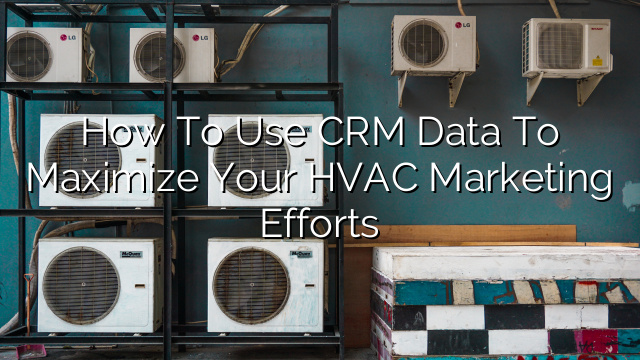Introduction
If you’re in the HVAC business, marketing and customer relationship management (CRM) go hand in hand. By effectively leveraging CRM data, you can maximize your marketing efforts and drive growth for your HVAC business. In this post, we’ll explore how you can use CRM data to take your HVAC marketing to the next level.
1. Segment Your Customer Data
One of the key benefits of using CRM is the ability to segment your customer data. By grouping your customers based on various criteria, you can create targeted marketing campaigns that resonate with specific segments. Some segmentation ideas for HVAC businesses include:
- Geographic location
- Customer type (residential, commercial)
- Frequency of service
- Demographic information (age, income level)
Segmentation allows you to tailor your messaging and offers to specific customer groups, increasing the likelihood of conversion and customer satisfaction.
2. Personalize Your Communications
Once you have your customer segments defined, it’s important to personalize your communications. Use CRM data to address customers by name and include personalized content in your marketing messages. This personal touch can go a long way in building customer loyalty and driving repeat business.
Additionally, consider using CRM data to send targeted promotions and offers based on customers’ purchase history or service needs. For example, if a customer recently purchased a new HVAC system, you can send them a special offer for routine maintenance or extended warranty.
3. Utilize Automation
Automation is a powerful tool in HVAC marketing, and CRM data can fuel it. Use CRM automation features to send timely reminders for routine service or filter customers based on preferred contact method (email, phone, SMS). Automation not only saves time and effort, but it also ensures that important communications don’t slip through the cracks.
Additionally, you can set up automated follow-up sequences based on customer interactions. For example, if a customer fills out a form on your website requesting a quote, you can automatically send them a series of emails providing more information and guiding them through the sales process.
4. Measure and Analyze Campaign Performance
Tracking and analyzing the performance of your marketing campaigns is essential for continuous improvement. With CRM data, you can easily measure the success of your campaigns and make data-driven decisions for future efforts.
Regularly review key metrics such as open rates, click-through rates, and conversion rates to evaluate the effectiveness of your marketing messages. Use A/B testing to experiment with different variations and determine what resonates best with your target audience. By continuously optimizing your campaigns based on CRM data, you can drive better results over time.
5. Leverage Customer Feedback
Your CRM data is a goldmine for customer feedback. Look for patterns in customer interactions, such as common complaints or frequently asked questions. By addressing these pain points in your marketing messages, you can build trust with your audience and position your HVAC business as a reliable solution provider.
Additionally, consider implementing surveys or feedback forms within your CRM system to gather direct feedback from customers. This valuable information can help you identify areas for improvement and enhance the overall customer experience.
FAQs
Q: How can I ensure the accuracy of my CRM data?
A: Regularly review and update your CRM data to ensure its accuracy. Implement data validation processes to prevent duplicates or incorrect entries. Consider automating data entry whenever possible to minimize errors and save time.
Q: What CRM software should I use for my HVAC business?
A: There are several CRM software options available for HVAC businesses, including industry-specific solutions like Jobber or ServiceTitan. Choose a CRM software that aligns with your business needs, offers robust features for marketing automation and data analysis, and integrates well with your existing systems.
Q: Can CRM data help with customer retention?
A: Absolutely! CRM data allows you to track customer interactions, service history, and preferences, enabling you to provide personalized and proactive support. By leveraging this data, you can nurture customer relationships, address concerns promptly, and offer relevant promotions to encourage repeat business.
Q: Is CRM data secure?
A: CRM data security is of utmost importance. Choose a reputable CRM provider that prioritizes data protection and compliance with relevant regulations, such as GDPR or CCPA. Implement proper access controls, encryption, and regular data backups to safeguard your CRM data from unauthorized access or loss.
Conclusion
By harnessing the power of CRM data, HVAC businesses can significantly enhance their marketing efforts. From segmenting customer data and personalizing communications to leveraging automation and analyzing campaign performance, CRM data offers valuable insights to drive growth and deliver exceptional customer experiences. Embrace the power of CRM data and take your HVAC marketing to new heights.






